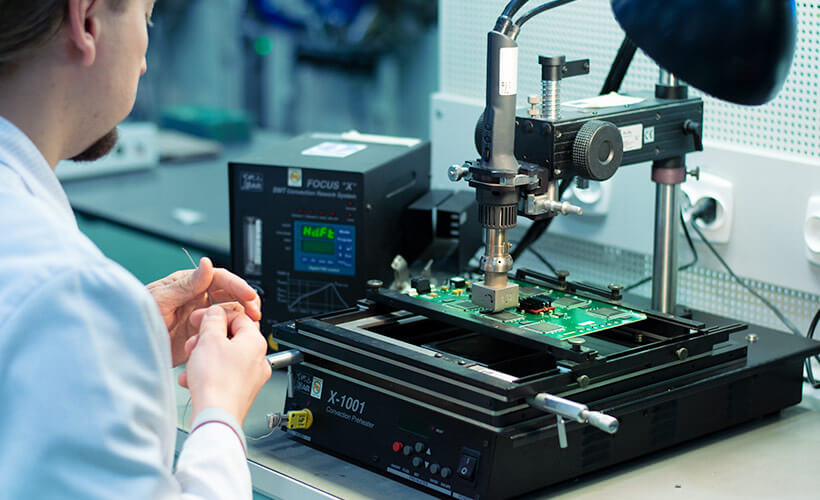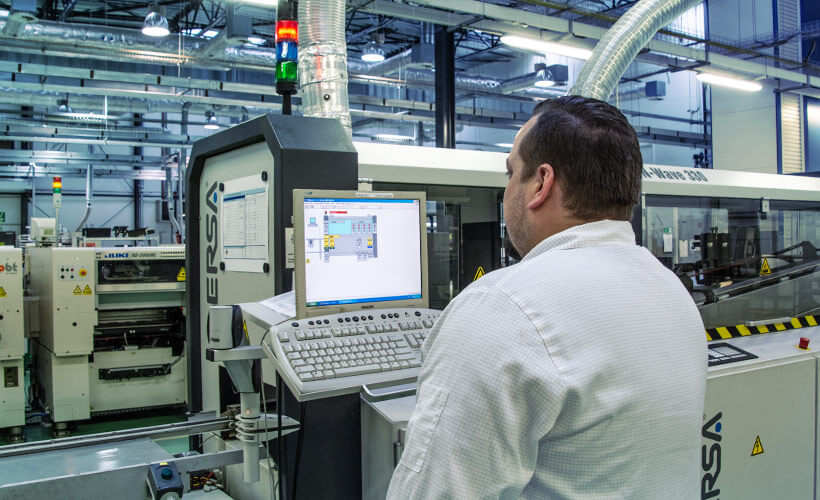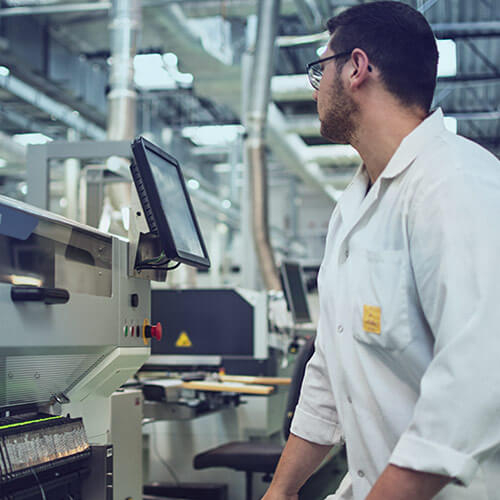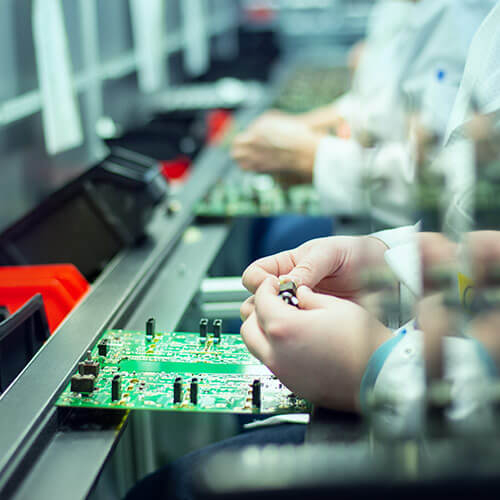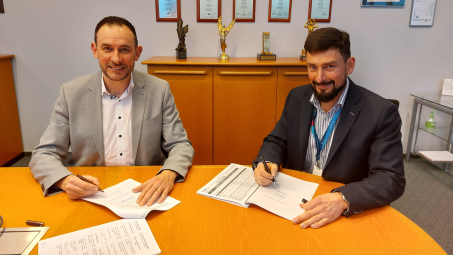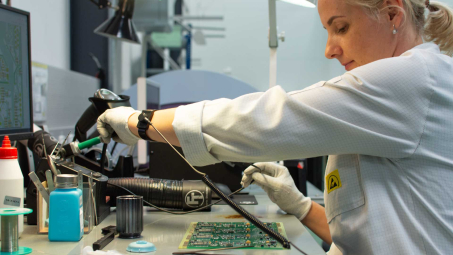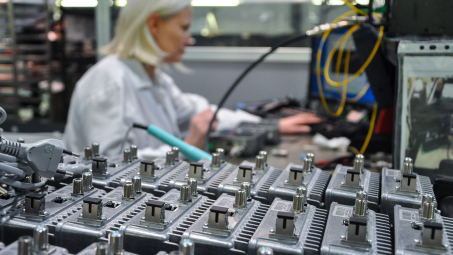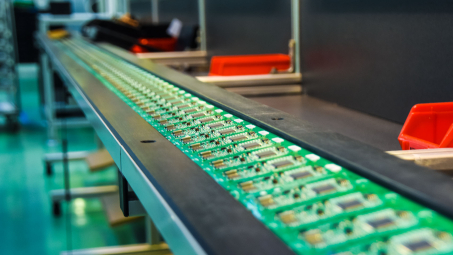CEO Bartosz Kajut talks about the strategy behind VECTOR BLUE HUB exponential growth
What are VECTOR BLUE HUB’s vision and strategy for exponential growth? What’s the fundamental element of our business development plan? To find out the answers to these and other questions, read the newly released interview with our CEO
A few years ago, the VECTOR Group from Gdynia, with a consolidated turnover of around PLN 200 million, underwent a major reorganisation, splitting into several specialised entities. The VECTOR BLUE HUB brand was created at that time, now constituting a separate company that the group uses in the EMS market. Bartosz Kajut, who has been with VECTOR for 18 years, headed the company, although, as he openly admits, he is relatively inexperienced in the EMS industry:
– About three to four years ago, we began the transformation of VECTOR BLUE HUB into an independent business that provides services externally instead of being an internal cost centre. And it set ambitious, or even very ambitious, goals right away: We know from our years of market experience that the best business is done when we are the leaders, not when we are at the end of the peloton. We have a clear strategy – we want to be the market leader. We have a clear strategy – we want to be the market leader.
The goal is clear: PLN 100 million turnover in 2025, assuming a 20–25% share of internal demand from the VECTOR Group
Such a revenue threshold means that in two years' time, the company would be the third/fourth largest EMS with Polish capital, after both Fideltronik companies and InterPhone Service. The forecast for the end of the financial year ending March 2023 is around PLN 50–60 million, so the company is only halfway there.
– We see that in the Polish market, few companies have managed to reach more than PLN 50–70 million. In the VECTOR Group, we have the experience of aggressively growing the business from PLN 20 million a year to PLN 70 million in 2–3 years. The ambition to reach the podium – of the top 3 Polish EMS – within the next two years is achievable.
Bartosz Kajut not only presents the vision clearly, but also describes precisely how to reach this goal. First of all, universal skills:
This reminds me of the once shocking statement by the current head of one of the global EMS present in Poland, that the key skill of the company is not so much knowledge in the field of electronics assembly, but the ability to organise production excellently, and that one of the Asian branches of the corporation, is about to start ... producing sports shoes.
– Yes, the ability to put components on a circuit board is a certain competence, but winning over a foreign customer, establishing a predictable process, and working with them regularly in a language they are familiar with – all this is a hard competence that takes years to build up. We have more than 20 years of experience in international business development, working with partners from Western Europe, North America, South America and Asia.
Second of all, the team, because this is always a key asset of the company
– What our current and future employees can expect from us is respect and a good working atmosphere. However, this does not mean that there are no difficult moments which require us to solve problems together. We never do this at the expense of people.
The company is proud of the fact that, even during the pandemic, production has never been delayed more than four weeks and that the purchasing department, thanks to more than 20 years of relationships with partners, has always been able to obtain the necessary components.
– I want to talk about the quality of our processes and the dedication of our people to the goal, and their responsibility for the end products. Of course, it's difficult to prove this at the first meeting with the customer, who, in order to discover our eminence, has to come into contact with the team, with our documentation and see how many things we think about and how many facets we consider. We engage in a profound dialogue with the customer in which we uncover the countless details of a project, and if someone only communicates by e-mail, by sending a draft and a BOM, this is not a process in which we are able to prove our worth.
VECTOR Group companies' relationships with partners have even become much deeper than a simple customer and supplier relationship
– If there are customers who really make a strategic decision to grow with us and the cooperation reaches a turnover of tens of millions of PLN, then we are ready to discuss a capital entry. We see such investments as a higher level of customer control over what happens in the company. It is again a unique competence in the Polish business market. Developing cooperation with strategic partners that – as in the case of Falcon V Systems, one of the group companies – have also become shareholders over time.
More and less conscious customers
– A fundamental element of our business development plan is to focus on foreign markets. We already have 2 global customers outside of Poland. Something that sets us apart is our ability to build a business with a foreign partner from scratch, from a chance meeting at a trade fair,' says Bartosz Kajut.
– Foreign companies have a lot of experience in the process of purchasing design or EMS services and fully understand the spectrum of consequences of their expectations from the supplier. They know that certifying a product, complying with a procedure and reporting, involves effort and, therefore, costs. I would not like to divide customers into Polish and foreign, but rather into more and less conscious. A customer who expects a full spectrum of services and is not prepared to pay for it has probably never experienced the consequences of taking shortcuts or failing to meet commitments.
A battle-tested team
A common trend among EMS companies is to extend their offerings into the design sphere. The scope of such services varies – from the design of the circuit board itself to the full product development process – and the actual resources that each company has are also different:
– We have a team of 20 people who have been designing for the VECTOR Group for over 20 years for the telecommunications and telemetry market. The team has been through countless projects intended for the European, North and South American markets. We can call them battle-tested.
In the last three years, sales of design services at VECTOR BLUE HUB have reached PLN 23 million. Comparing this to the revenues of even the largest Polish design companies, this is a very good result. Bartosz Kajut's vision of this type of service coincides with the broadest definition of 'design':
– We need to understand what the requirements are for the whole product, not just the circuit boards. Such a thorough approach to the design service also has other consequences – specialisation is essential. Being responsible for the customer's business and success, we opt not to take on assignments that go too far beyond our experience, and the designed product must be close to the core of our expertise.
– The ideal situation is to combine design and production services, but on the other hand, this does not have to be the case at all. The production process is much more versatile, although even in this field, we try to limit our area of interest and screen out the orders that we do not want to do. In terms of electronics and electromechanics alone, we have had a huge number of quotations over the last 2–3 years, and there have been a few that we rejected. - We rejected the e-cigarette cartridge project - in this case, we were not able to deliver added value, and the fixed costs would probably have been too high.
VECTOR BLUE HUB's growth has been organic, but with an intentional focus on the customer experience
– Where do our ambitions end? They end where the board and I would not be able to effectively control the organisational culture, at the point when our employees start to become distant from us. In order to deliver added value to the customer, a sense of ownership by the whole team is crucial. From a certain scale of business – I can't quantify it by revenue size or the number of employees – the management is already very distant from its people, fixated on charts, and no longer has a sense of what is really going on in the organisation, says Bartosz Kajut about the limits of his ambitions, but still does not say that he senses any limits; instead, he talks about what he wants. There are also, of course, more tangible boundaries, such as the space for the factory expansion.
– And it will be a difficult decision because we are very well located here. Even if financially it makes sense, it's not necessarily what we're interested in. Rather, we will go upmarket to even more difficult, high-margin projects, which of course, will involve deep specialisation in the telecommunications industry as we know it, but also in the medical sector, including life-critical devices.
Credits: Łukasz Jaeszke, https://tek.info.pl/





